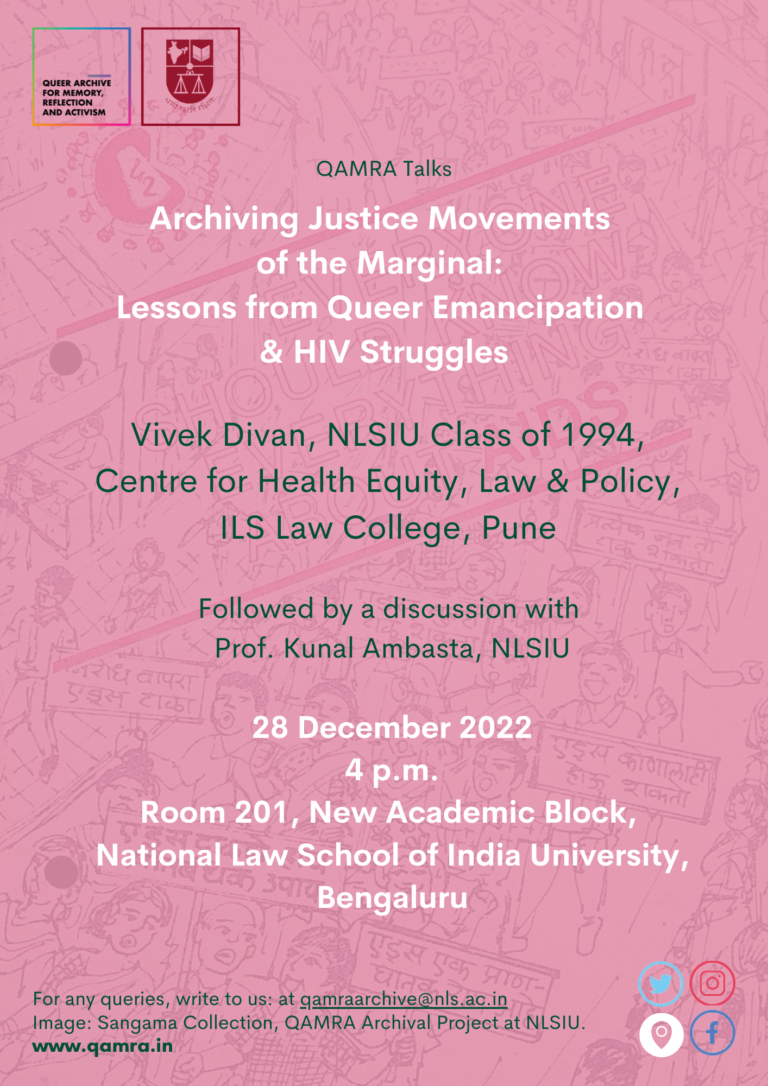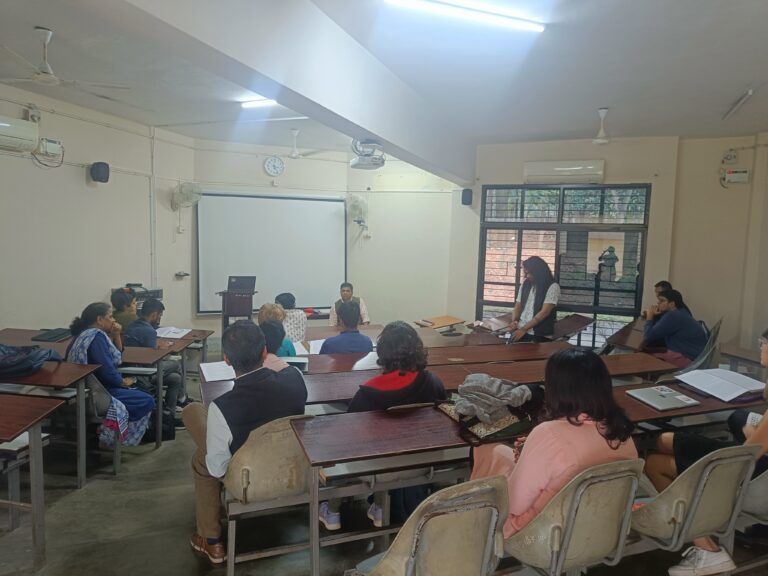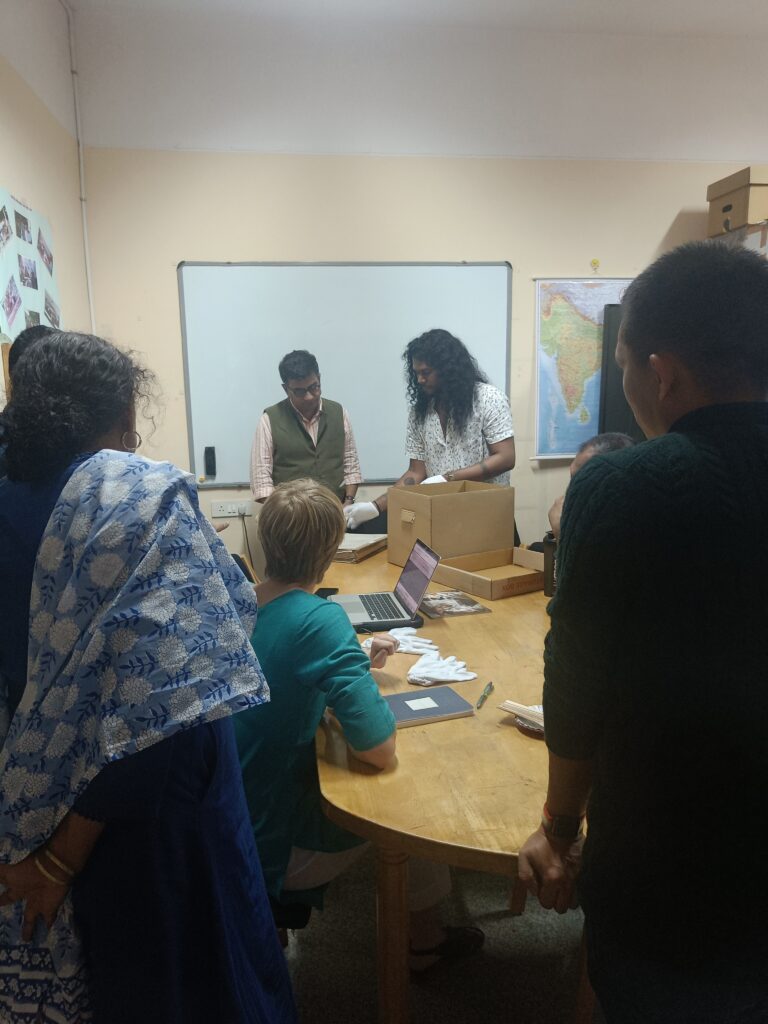The QAMRA Archival Project at NLSIU was delighted to host its advisory member and NLS Class of 1994 alumnus, Vivek Divan, on campus on 28 December 2022.

Vivek Divan is a human rights lawyer, queer activist and expert on health law and policy. He founded the Centre for Health Equity, Law and Policy (C-HELP) at the ILS Law College, Pune in 2019.
Vivek began with a recollection of a cleric from a small town who, having chanced on an HIV/AIDS Know-Your-Rights awareness pamphlet published by Lawyers Collective HIV/AIDS Unit (LCHAU) at a hospital clinic in remote Maharashtra, visited the organisation’s Mumbai office in 2004. As Coordinator of the Unit, Vivek recounted the interaction: the trepidation and disempowerment with which the visitor entered the office, the slow but sure manner in which his confidence increased and body language transformed while coming out to Vivek over several hours of conversation, while also realising that he was speaking to another queer person, and finding solace in this affirmation. Although his quandary didn’t find a legal solution – being bullied by locals he passed daily who cast homophobic slurs at him due to his feminine gait – his and Vivek’s experience impacted them both in fundamentally positive ways. Vivek noted how much lawyering happens outside the courtrooms, and how such experiences greatly affect the ways in which lawyering inside the courtrooms is influenced and shaped. Instances like these and others related to community organising deeply impacted the ways in which LCHAU conveyed queer marginalisation when it filed and fought the Naz case in relation to section 377. It is, therefore, vital that legal histories take into account the social life of cases – what happens outside the courtroom as much as that which happens within, he noted.
Divan also spoke of the social life of the 377 case by describing the ways in which he coordinated significant efforts at community engagement and mobilisation when helming LCHAU. He began by speaking of the origins of the Naz petition, touching on how LCHAU was informed by its previous experiences in public interest litigation, and its recognition of the need to engage those who may have concerns on the removal of section 377 as a protective law, namely child rights groups, as there was no other law governing child sexual abuse in 2001. While such engagement took place, after the filing of the case backlash came from unexpected quarters, being sections of the LGBTQ community.
Referring the audience to his paper, which describes this in greater detail, Vivek then spoke of how his and LCHAU’s work on HIV, influenced the handling of the 377 case. In 2002 LCHAU was asked to draft an HIV/AIDS law for India, which it did after undertaking extensive nationwide consultations with affected communities to input on a draft law. This process led to LCHAU adopting a similar process that brought the queer community across the country together to deliberate on strategizing for the Naz case. It became a unifying and galvanising process that augmented courage, a multitude of ideas, and brought arcane legal processes to be fully understood by a diverse section of the community.
Vivek also shared insights from his HIV-related law and rights work, especially in the context of how campaigns by people living with HIV, other affected communities such as sex workers and the LGBT community demanded access to affordable HIV medication like anti-retroviral therapy as part of their right to health, and their success in attaining this claim. The HIV movement brought rights claims to the fore, which is reflected in what is now HIV Act, India’s first anti-discrimination law. The take-away from the work undertaken then, he said, was that protection of rights and the empowerment–not isolation–of people is the answer, which ought to be kept in mind in the COVID-19 context as well.
The discussion was moderated by Prof. Kunal Ambasta, who asked about community consultations after the 377 case. Reflecting on the 2013 Kaushal judgement, Vivek said that the adverse judgement spurred a new way to mobilize. There was a shared sense of unity and purpose – that we were not going back. Asked about his own archiving efforts with respect to his father, Senior Advocate Anil Divan’s papers, he said the family undertook the effort because legal histories aren’t well archived, particularly the histories of key constitutional cases. Many people involved in them have passed away. Presenting these legal journeys through a podcast was felt to be a unique and accessible way to appeal to a wider audience.

Asked about the nature of mobilization in the context of today’s social movements, Vivek shared a powerful anecdote on sensitization: During its HIV and law awareness work, LCHAU realised that multiple people at different levels needed to be sensitized for a holistic response to the health challenge – from trade unions and doctors to the police, and also judges. LCHAU decided that with judges, it would be best to get peers to speak with them: Justice Michael Kirby (Justice of the High Court of Australia who served between 1996-2009) and Justice Edwin Cameroon (Justice of the Constitutional Court of South Africa, 2009-2019). Both judges are openly gay and Justice Cameroon is openly HIV-positive. They agreed to come down in 1998 to conduct workshops, and they visited India every two years till 2010 for judicial sensitisation. Justice AP Shah, who was a junior judge in the Bombay High Court in 1998, was Chief Justice of the Madras High Court in 2007 on one of these visits, when he invited them there to speak to that court’s judges. Vivek recounted such days of training vividly,
“Justice Edwin has a pocket notebook and takes notes of everyone’s names when they introduce themselves and shakes everyone’s hands. By the end he can put faces to the names and asks the judges ‘Have you ever met anyone with HIV?’ and follows to reveal that he is. Everyone was shocked… Justice JS Verma who was head of the NHRC then and had participated in a workshop in Gujarat – he just went up with tears in his eyes and hugged Justice Cameron.”
The discussion ended on a thoughtful note. Vivek drew our attention to C-HELP’s policy brief Happy Together, and ended by saying that we need to pay more attention to HIV at a time when funding is difficult to obtain and public awareness campaigns have fallen silent, because clinics are still registering many positive cases, especially among members of the queer community.
Vivek also spoke with students in QAMRA’s elective course, Preserving Memories: Law, Social Transformation and the Queer Archive:

And visited our archive, which turned out to be a fun, interactive session!
